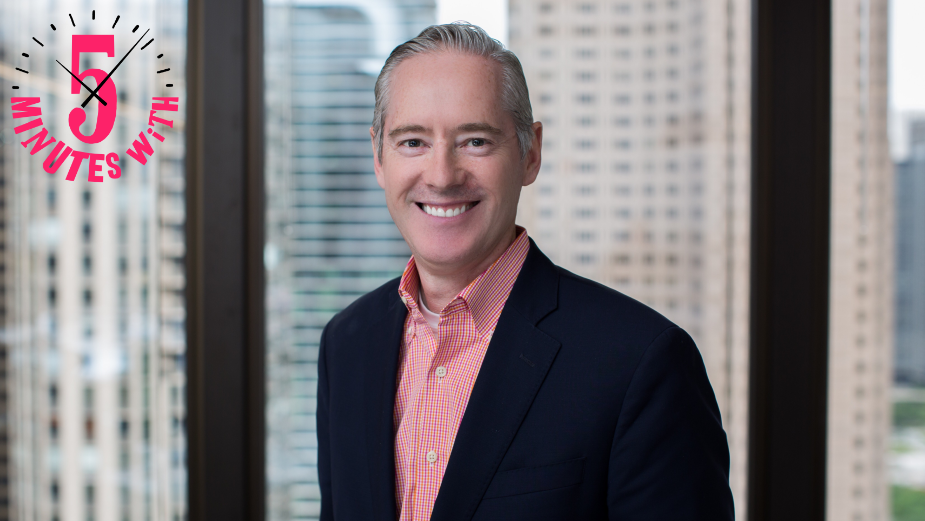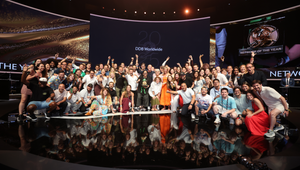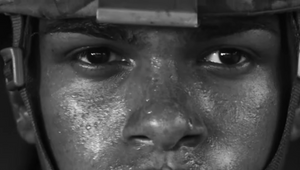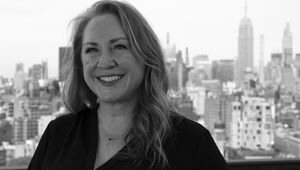
5 Minutes with… Dave Kissel

As a partner to McDonald's in 45 countries, the world's largest restaurant company is also DDB's biggest multinational client. In his role as global business lead for McDonald's at DDB, Dave Kissel is the person responsible for the global leadership and coordination of the agency's worldwide relationships with its biggest client. Along with DDB's global chief creative officer for McDonald's, Luis Miguel Messianu, who was appointed to the newly created role earlier this year, Dave helps each office deliver high-impact strategy, content and experiences to grow the McDonald's brand and business.
But, how does that work in practice? Among other things, through a combined local and global view on the world, the smart application of centralised tech - which is aptly named McWisdom - and the brain-clearing benefits of one of the longest daily running streaks in the world.
LBB's Addison Capper caught up with Dave.
LBB> You're the global business director at DDB for its McDonald’s business, which, given the size of that business, is a pretty huge role! Tell us a bit about it and what it entails.
Dave> Any great role starts from a need. DDB and McDonald's go way back to 1971. Soon after the relationship started in the US, it also started in Australia and in Germany, and somebody way before me and way smarter than me thought that if we had McDonald's in a number of countries, maybe there's a need to have some level of coordination and communication between our shops that all have the same client. So, the role kind of formally took shape in the late '90s and was originally called the 'global coordination fund', which is funny because the internal budgeting system is still labelled that way. It started as coordination and communication, but evolved into a recognition that, not only do we now have the business in 46 markets, but the challenges and the issues that our teams face on McDonald's or McDonald's faces in one part of the world are pretty common in other parts of the world.
LBB> What’s a modern day example of that?
Dave> We are trying to build the McCafé brand. Certain markets may be at different stages of their lifecycle - it started in Australia, but there are other markets launching McCafé. So we've built a tremendous amount of IP at DDB around all of these business issues, product offerings, and service offerings, such as how to launch the app, how to do loyalty, how to do Happy Meal partnerships in the right way. Long story short is that my role and my team's role is a very simple one. It starts with this belief that if you work on McDonald's at DDB anywhere in the world and you have anything you need to accomplish, you shouldn't have to start from scratch. It then forced us to think about if you, for example, are on day one working in our office in Paris and just got a McCafé brief, how can we be helpful to you?
LBB> What is a way that your team could quickly help that new creative in Paris?
Dave> When I came into the role about five years ago, we did not have any centralised location for all of our IP. So we found the best creative examples, briefs, strategic frameworks, consumer research, and curated and catalogued it, and put it up in a digital library that we call McWisdom. I have a full-time person based in Amsterdam whose role is to curate that library. What's great about the real time digital communication and tools that we have, if you're anywhere in the world with DDB, you can type on Microsoft Teams a message to McWisdom, which is our internal team, and we've got that covered in eight hour shifts. Any question. It's akin to you coming to the front of the supermarket and saying, 'I want to make an Italian dinner tonight,' and we will go in the grocery store and will pull all the things on the shelf that you say you need and know you need, but also maybe some of the things that you didn't think you'd need. We're super proud of having built that because, number one, it's connected markets.
The three C's of what I and my team do is connect - and McWisdom is part of that. Second is consult. If you've got an issue, we'll fly in and we'll help you, we'll do workshops, for example a part of my team earlier this year did a value workshop in India. And the last C is create - we make stuff. It didn't take us long a couple of years ago [when covid hit] to realise that store traffic was going to decline, and McDonald's business plans are based on store traffic and how much the average cash register is going to ring. What can we do in 30 to 45 days to get it back up? We built a workshop that we can deploy; we can fly in and literally within one week we get you actionable things that you can do to reverse those problems. We've run that workshop in many, many markets because it's a common problem. Connect, consult, create, those are the three C's of our role. The fun part of it for me is that it involves 46 markets, so there's never a dull moment. There's always something that's on fire, but there's always something that's an opportunity too.
LBB> Earlier this year DDB named its first global CCO specifically for McDonald’s. Can you tell us more about that appointment? Why was now the right time and why was that role needed? And why was Luis Miguel the right person for the job?
Dave> We start from the basis of strength because this year McDonald's was named the most effective brand in the world by WARC for the third year in a row and named by the Effies as the most effective global brand. Our client has been on a journey of creative effectiveness for about the last three or four years - they made it a priority. Marketing is a key driver of growth for McDonald's, as stated by the CEO. So, the effectiveness part, we've got down. We - all of the agencies that work on McDonald's, and all of the client partners that work on it - know we have an opportunity to consistently do more break-through creative work.
McDonald's marketing is funded locally - decision making and creation happens locally. That's worked very well because it makes sure that the brand is reflected and relevant in a very global way, but one of the challenges of that is continuing to raise the bar from a quality standpoint. It was important for me, knowing that we've done a pretty good job as DDB, we've got a lot of work that we're very proud of, but having somebody who's steeped in the brand, who has the ability to understand different cultures and how the brand shows up differently in different cultures, and who can really ride the overall quality of our work was going to be important. So I went to our management and said that I thought the time was right for us to make this a job, and we had the perfect person in Luis Miguel. He's spent more than 30 years on the brand, helped launch it in Mexico, has been involved in a lot of phenomenal work with McDonald's over the years, he knows the franchisees very well, knows the crew kids and the people who work in the restaurant very well, and is just a great human being. It's not enough to look at the work after it's done and say, that's good or that's bad or should be better. Luis Miguel is involved in the middle of the process with our teams because that's the part you want to affect.
LBB> You’ve already mentioned things like launching McCafé, but what is DDB’s involvement with McDonald’s outside of regular advertising? How involved is the agency in, say, user experience and restaurant design and things like that? And how does that impact your role?
Dave> The history of DDB being more than just an advertising partner goes back to the very beginning. In 1971, McDonald's had Ronald, but it was DDB's Keith Reinhard who created Grimace, the Hamburglar, and all the other characters. It was DDB who helped launch breakfast in the US. Then my team launched all day breakfast. Those are ideas that are business type ideas, they're not necessarily just marketing ideas. One recent example is from our team in India. There are more than one million people in India that have some limitation with their limbs, and our team came up with packaging that allows you with one hand to eat a burger. It's called EatQual and is packaging in which the burger sits vertically, where you take the lid off, and you can pick up and eat the burger with one hand. It was a proactive idea, something we brought to McDonald's in India and now it's in all their restaurants. It's one of those small things that shows that McDonald's is inclusive, and it's one of the core values of the brand that we want the McDonald's experience accessible to everybody. We're in year two of that, and there are other kinds of exciting things that we're working on around the globe that are making McDonald's more environmentally conscious, sustainable and inclusive.
A great thing about our clients is that they'll listen to an idea like that, because it comes from a place of knowing the brand well enough to be aware what opportunities exist for it within the consumer space and operationally how to get it done. That's key. It's not just about the ideas but getting them done.
LBB> From a sustainability standpoint, what kind conversations are you having with McDonald’s?
Dave> They have a tremendous amount of initiatives internally and corporately, from sustainable farming and fishing, to being carbon neutral in terms of their happy meals and toys, and moving to more virtual experiences versus hard plastic toys. There have been a number of different programmes around the world where you can turn your used Happy Meal toy in and get a virtual experience. McDonald's in places like Japan has actually taken those toys and melted them and turned them into trays for the restaurant. We're working on a number of initiatives that will reduce things like ink use in packaging, packaging itself, and also just being conscious that McDonald's is a global citizen and a local citizen.
LBB> Outside of work, is it true that you run something like three miles every day and have one of the longest running streaks in the world?
Dave> It's somewhere over 15 years, never missing a day. There's a crazy organisation, called something like the World Running Streak Association where you have to run a minimum of one mile within 24 hours of the timezone you woke up in. I would get up every New Year's Day feeling not so great and like I needed to run. And then I felt good, so I'd run the second day and one year I made it to around March 1st, and here I am. I run first thing in the morning and it allows you to see cities that otherwise you might be in and out of, only seeing the airport and the inside of a conference room. But anyway, I'm in the top 175 in the world now in terms of longest streak.
LBB> Surely you must have been in some tricky scenarios where getting your run in might not have been possible?
Dave> A few years ago I had to go from Cannes to Auckland. The journey was from Cannes to Paris, to JFK, to LAX, to Auckland. When I was in LAX, I realised that I was going to miss my streak. So, I had to get what they call a 'streak saver'. I was running around the terminal at LAX with my carry on. I didn't do three miles but I did get my mile in. Running in an airport is not all that strange, but somebody running from one end to another, after a couple of laps people are wondering what is wrong with this guy. But I'm a firm believer in, if you don't think somebody's a little weird or quirky, you just don't know them well enough. That's my quirky and weird thing.
---
Additional reporting by Tamara Felemban















